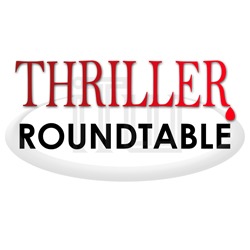

February 21st to 27th: “Who is the best protagonist of all time? Why?”
 Is it James Bond? Jack Reacher? Joe Pike? Stephanie Plum? Join ITW members Sharon Linnéa, Jamie Freveletti, C.E. Lawrence, Richard Godwin, Weyman Jones and Jim Duncan as they discuss this week’s Thriller Roundtable question, and be sure to chime in with YOUR favorites!
Is it James Bond? Jack Reacher? Joe Pike? Stephanie Plum? Join ITW members Sharon Linnéa, Jamie Freveletti, C.E. Lawrence, Richard Godwin, Weyman Jones and Jim Duncan as they discuss this week’s Thriller Roundtable question, and be sure to chime in with YOUR favorites!
Sharon Linnéa’s latest books were a trilogy of thrillers, CHASING EDEN, BEYOND EDEN and TREASURE OF EDEN from St. Martin’s Press (new versions out next year!) Her next novel is THESE VIOLENT DELIGHTS, a mystery that will be released in May 2011. Sharon wrote award-winning biographies of Raoul Wallenberg and Hawaii’s Princess Kaiulani before turning to fiction. Visit her at SharonLinnea.com.
Jamie Freveletti is a trial attorney, martial artist, and runner. She has crewed for an elite ultra-marathon runner at 50 mile, 100 mile, and twenty-four hour races across the country, and holds a black belt in aikido, a Japanese martial art. After law school she lived in Geneva, Switzerland while obtaining a diploma in International Studies. Back in Chicago, she represented clients in areas ranging from class actions for mass salmonella poisoning to securities fraud. Her debut thriller, Running from the Devil (HarperCollins/ Morrow 2009), was chosen as a “Notable Book” by the Independent Booksellers of America, awarded “Best First Novel” by the International Thriller Writers , awarded a Barry Award for “Best First Novel” by Deadly Pleasures Magazine, and nominated for a Macavity Award for” Best First Mystery” by the Mystery Readers International and “Favorite First Novel of 2009” by Crimespree Magazine. It has been translated into three languages and was an international bestseller. Her second novel, Running Dark, released in June, 2010, hit both the Chicagoland and South Florida bestseller lists and won a “Lovey” award for Best Novel 2010. In January, 2011, she was tapped by the Estate of Robert Ludlum to write the next in the Covert One series. The thrid novel in her seires, titled “The Ninth Day” will release in October, 2011. She lives in Chicago with her family.
C.E. Lawrence is the byline of a New York-based suspense writer, performer, composer and prize-winning playwright whose previous books have been praised as “lively. . .” (Publishers Weekly); “constantly absorbing. . .” (starred Kirkus Review); and “superbly crafted prose” (Boston Herald). Silent Screams and Silent Victim are the first two books in her Lee Campbell thriller series. Silent Kills comes out later this year. Her other work is published under the name of Carole Bugge.
Richard Godwin’s novel APOSTLE RISING is being published March 10th 2011. He is widely published in magazines and anthologies, as well as being a produced playwright. His story ‘Pike N Flytrap’ is in the latest issue of Needle Magazine and his story ‘Face Off’ is in Issue #5 of Crime Factory. You can check out his writing credentials and listen to his recent interview on The Authors Show at his Web site.
Critics describe Weyman Jones’ latest novel as “a great thriller filled with action and misdirection.” Author of three previous thrillers, he has also written written award-winning historical novels for children and a non-fiction book on computers that was republished in several languages.
Living and working away in the state of Ohio, Jim Duncan is a writer of dark, urban-fantasy-suspense. His first novel, DEADWORLD, published by Kensington, will be out in April, 2011.
| Living and working away in the state of Ohio, is a writer of dark, urban-fantasy-suspense. His first novel, DEADWORLD, published by Kensington, will be out in April, 2011. |
- LAST GIRL MISSING with K.L. Murphy - July 25, 2024
- CHILD OF DUST with Yigal Zur - July 25, 2024
- THE RAVENWOOD CONSPIRACY with Michael Siverling - July 19, 2024
